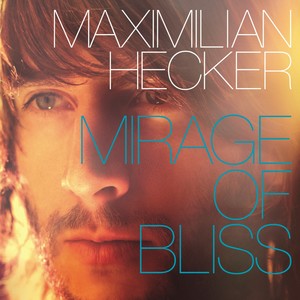
Mirage of Bliss
- 流派:流行
- 语种:英语
- 发行时间:2012-07-27
- 唱片公司:StreetVoice
- 类型:录音室专辑
- 歌曲
- 时长
简介
DOWN IN THE HOLE In the spring of 2010, Maximilian Hecker releases his album "I Am Nothing But Emotion, No Human Being, No Son, Never Again Son", on his own label Blue Soldier Records. It's a musical self-discovery. Hecker stripped, freed of all glamour, with unprofessionalism as a concept. Grand piano concerts in jogging pants and woollen cap, without a set list, improvising, changing tempos like the wrecked Dylan in '66, and facing every aspect of show business with a complete rejection that almost seems juvenile; not to mention Hecker's autistic Bontempi street performances. To continue and accelerate this journey into one's own chaotic, pure and child-like soul, there of course needs to be the appropriate recording equipment: after the room microphone of "I Am Nothing But Emotion, No Human Being, No Son, Never Again Son", there's just a dictaphone for preparing MIRAGE OF BLISS. TOKYO REVISITED Previously, in the autumn of 2010, Hecker, being on a futile mission to find again his muse Nana in Dogenzaka in order to give her "her" album, fell in love with a Japanese photographer and promptly moved to Tokyo for her sake. Only to fail at love, once again, and return to Berlin after just six weeks, defeated. There, he worked these experiences into songs. OF PHOENIXES, ASHES, AND LOVE With MIRAGE OF BLISS, his seventh album, Hecker focuses on the eternal conflict between his yearning for love and intimacy, and his simultaneous desire for isolation; it's the gnawing question of "The Whereabouts of Love", especially after it had seemingly become a reality ("If Only I Could See" and "Heavenlies"). Hecker may seem to be celebrating love in his songs, but in fact he's always on the run from it. Because love means inviting another one into his private world. But the way Hecker extends this invitation, ultimately keeps them at a distance too. He's a disciple of distance, a virtuoso of love most remote. As a lover and a singer, he practices the art of self-exile from love. He speaks of "sirens with outlandish wings" ("Mirage of Bliss, part I"), referring to his many sojourns in Asia and the delusions of salvation, the mirages of bliss that he projects on the foreign culture. Hecker's regressive yearning to "drown in golden oceans of daze" ("Mirage of Bliss, part I&II"), as well as his vision of "The Forsakenness of Raging Love", all seem like metaphors for his escape from the trials of human relationships. And yet he summarizes his situation with an unexpected hopefulness, when he sings "I am wandering, I am straying, I will always do" ("Treasure Trove"). BERLIN, SPAIN, AND BACK So in the spring of 2011, Maximilian Hecker records demos on the aforementioned dictaphone: piano and voice, almost identical in sound to "I Am Nothing But Emotion, No Human Being, No Son, Never Again Son". When he sends these recordings during the summer to a number of internationally renowned producers, he sees it as more of an ironic experiment. However, to his surprise, some of them respond immediately and with enthusiasm, including Chris Potter (The Verve, Richard Ashcroft), Martin Terefe (Ron Sexsmith, James Morrison, A-ha) and Youth (The Verve, The Fireman, Embrace). The greatest interest is shown by Youth, a founding member and bassist of Killing Joke and a musical collaborator of Paul McCartney in The Fireman. When these two characters meet, they couldn't be more different – Youth being ultra-relaxed, while Hecker's full of nervous self-control – but the chemistry fits like magic. The two get along immediately, and find themselves on the same wavelength musically. Hecker, who Youth will later call a "fearless knight in armour and a cavalry charge into the unknown", finds the encounter so promising that he not only comes to terms with the idea of studio work, which he actually dislikes, but even puts himself into debt, in order to pursue this unique collaboration between driven, German Romanticism and hippie-esque, British cool. The synergy between these two deeply committed musicians turns out to be so fertile that they ultimately record twelve songs in fourteen days, at Youth's studio in the south of Spain. MIRAGE OF BLISS sounds lush and British. Coldplay guitars, Travis riffs and Scott Walker orchestration. Hecker returns to his roots, once again playing all instruments like on his first albums, except for the bass guitar which is contributed by his collaborator. There even emerges a song written by Hecker and Youth together during a alcohol-fuelled night-time jam session, the epic and completely "un-Hecker" 道玄坂 (Japanese for Dogenzaka). YOUTH: FAMOUS LAST WORDS On the last day of recording, Youth lets looses and dances in the studio's control room to the entire song "The Whereabouts of Love", like a completely unselfconscious, music-crazed teenager, no longer the established producer – he celebrates the music and thereby gives his blessing to MIRAGE OF BLISS. Youth: "What I love about Max, he's a fearless outsider artist, he's prepared to work on those outside areas, because he's passionate about it. And it's not just even reactionary to what's going on, it's really just a passion for those kind of heartfelt emotions that you don't really hear today, because they're all disguised by very cleverly constructed masks of cool. And I think you have to be quite fearless and brave and courageous to reveal the feelings and the emotions that he's stirring up and bringing up – today. And that's what's exciting. That's what makes it dangerous actually. And that's where the challenge is. And that's where the treasure is as well."







